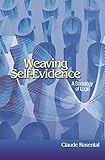Weaving Self-Evidence : A Sociology of Logic / Claude Rosental.
Material type: TextSeries: Princeton Studies in Cultural Sociology ; 13Publisher: Princeton, NJ : Princeton University Press, [2022]Copyright date: ©2008Description: 1 online resource (312 p.)Content type:
TextSeries: Princeton Studies in Cultural Sociology ; 13Publisher: Princeton, NJ : Princeton University Press, [2022]Copyright date: ©2008Description: 1 online resource (312 p.)Content type: - 9780691227504
- Logic, Symbolic and mathematical -- History -- 20th century
- Logic, Symbolic and mathematical -- Social aspects
- Reasoning -- Social aspects
- SOCIAL SCIENCE / Sociology / General
- Abstraction
- Accompaniment
- Accreditation
- Accusation
- Artificial intelligence
- Attestation
- Black, Max
- Boole, George
- Calculus
- Center of calculation
- Cognition
- Coordination
- Differentiation
- Douglas, Mary
- Emphasis
- Evaluation
- Exhibition
- Explicitation
- Formalism
- Formalization
- Goffman, Erving
- Granet, Marcel
- Haack, Susan
- Hamilton, William Rowan
- Husserl, Edmund
- Inconsistency
- Institution
- Intuition
- Kosko, Bart
- Kruse, Rudolf
- Largeault, Jean
- Lawler, Dennis
- Logicism
- Magma
- Maneuvering room
- Network: of actors
- Neutralization
- Orchestration
- Orientalism
- Ostentation
- Paradigm shift
- Paraphrase
- Pickering, Andrew
- Plato
- Polya, George
- Predicate
- Priority
- Quantifier
- Quasi-object
- Relativism: cultural
- Routine
- Russell, Bertrand
- 511.3 23
- Q175.32.R45
- Q175.32.R45 .R674 2008
- online - DeGruyter
| Item type | Current library | Call number | URL | Status | Notes | Barcode | |
|---|---|---|---|---|---|---|---|
 eBook
eBook
|
Biblioteca "Angelicum" Pont. Univ. S.Tommaso d'Aquino Nuvola online | online - DeGruyter (Browse shelf(Opens below)) | Online access | Not for loan (Accesso limitato) | Accesso per gli utenti autorizzati / Access for authorized users | (dgr)9780691227504 |
Frontmatter -- CONTENTS -- ACKNOWLEDGMENTS -- INTRODUCTION -- PART ONE: ACCESSING THE WORLD OF PRODUCERS OF LOGICAL STATEM -- CHAPTER 1. HOW CAN WE GRASP WHAT LOGIC-MAKERS DO? QUESTIONS RAISED IN THE HUMAN SCIENCES AND PHILOSOPHY ABOUT LOGIC AND MATHEMATICS -- CHAPTER 2. SPACES AND TOOLS FOR EXCHANGE -- PART TWO: PRACTICES OF DE-MONSTRATION: DEBATING A THEOREM IN AN ELECTRONIC FORUM -- CHAPTER 3. BRINGING TO LIGHT: DEMONSTRATION PUT TO THE TEST OF ANTAGONISTIC LOGICAL PRACTICES -- CHAPTER 4. EVALUATING THE CORRECTNESS OF A THEOREM AND THE PROPERTIES OF A LOGIC AT THE INTERSECTION BETWEEN SEVERAL DE-MONSTRATIVE MODES -- PART THREE: MEDIATIONS USED TO ADVANCE A LOGICAL THEOREM -- CHAPTER 5. MEDIATIONS USED TO ADVANCE. A LOGICAL THEOREM -- CHAPTER 6. FEDERATING A COUNTER-DE-MONSTRATION OR PRODUCING HAND-TAILORED RESPONSES -- CHAPTER 7. THE EMERGENCE OF A QUASI-OBJECT AND A COLLECTIVE STATEMENT -- CONCLUSION. A SOCIOLOGY OF THE PRACTICES OF DE-MONSTRATION -- WORKS CITED -- INDEX
restricted access online access with authorization star
http://purl.org/coar/access_right/c_16ec
The development of theorems in logic is generally thought to be a solitary and purely cerebral activity, and therefore unobservable by sociologists. In Weaving Self-Evidence, French sociologist Claude Rosental challenges this notion by tracing the history of one well-known recent example in the field of artificial intelligence--a theorem on the foundations of fuzzy logic. Rosental's analyses disclose the inherently social nature of the process by which propositions in logic are produced, disseminated, and established as truths. Rosental describes the different phases of the emergence of the theorem on fuzzy logic, from its earliest drafts through its publication and diffusion, discussion and reformulation, and eventual acceptance by the scientific community. Through observations made at major universities and scholarly conferences, and in electronic forums, he looks at the ways students are trained in symbolic manipulations and formal languages and examines how researchers work, interact, and debate emerging new ideas. By carefully analyzing the concrete mechanisms that lead to the collective development and corroboration of proofs, Rosental shows how a logical discovery and its recognition within the scholarly community are by no means the product of any one individual working in isolation, but rather a social process that can be observed and studied. Weaving Self-Evidence will interest students and researchers in sociology and the history and philosophy of science and technology, and anyone curious about how scientists work.
Mode of access: Internet via World Wide Web.
In English.
Description based on online resource; title from PDF title page (publisher's Web site, viewed 29. Jul 2022)


